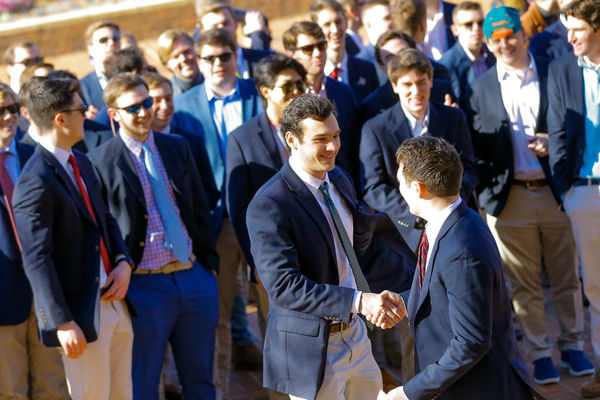On Sept. 2, Furman sent out an email explaining that the Kappa Alpha (KA) fraternity “has been notified that they are on interim suspension while the university investigates reports of unauthorized parties held… at the former Kappa Alpha fraternity house.” A week later, they sent a follow up email stating that the fraternity has been suspended “for a period of no less than four years.” While the punishment may at first seem draconian, this response was imperative in order to send a clear signal to students: uphold your end of the deal, or face the consequences.
Before returning to campus, Furman required students to sign, and thus buy-in to, the Paladin Promise. Failure to comply with the agreement’s stipulations results in punishment, with the extent of the repercussions determined by the severity of the violation; disciplinary guidelines can be found on Furman’s website. Regarding KA’s offense of “hosting a gathering that exceeds [the] guest limit,” it states that appropriate sanctions can be anything from semester-long suspension to expulsion. Furman warned they would not take transgressions lightly; KA obviously perceived their parties to be worth the risk. Given the University’s warning, the suspension of the fraternity should come as a surprise to no one.
Furman’s response may seem harsh, but one must consider the context of KA’s offense to fully understand the punishment. KA blatantly disregarded the rules set in place to keep students and faculty safe on campus. If Furman did not throw the book at them, the Promise would have been exposed as nothing more than a set of unenforced suggestions. By adjudicating swift and hard justice, Furman demonstrated that they mean business. However, the administration’s decision did contain hints of restraint. As far as I am aware, none of the party-goers or fraternity brothers were expelled. Furman proved its point, yet avoided rash and extreme action.
While some may view these restrictions on social life as suffocating, the actions — or lack thereof — of other universities to impose similar limits has made the necessity of enforcing these rules at Furman apparent. A glaring and infamous example of enforcement shortcomings has been seen at the University of North Carolina at Chapel Hill (UNC). When students came back to campus, they proceeded to do just what they have done any other year; fraternities and sororities hosted their back to school parties, and students attended them in droves. Within a week, outbreaks emerged and the entire undergraduate student body moved to remote learning.
UNC is not alone in its failures. Another school, one a bit closer to home, has also proved news-worthy – the University of South Carolina (USC). At the beginning of the semester, the campus experienced a similar, albeit not as quick, outbreak of cases. However, after weeks of unchecked parties, USC has reported over 1,000 students testing positive for coronavirus. While no official moves have been taken to transition students towards remote learning or a campus shutdown, there is certainly fear that the University will be forced to take these steps if the situation does not improve.
After seeing these two schools receive national news coverage, Furman’s rules seem all the more vital. At the beginning of the semester, Furman stated in an email that it did not feel skeptical “about the ability of college students to put others ahead of themselves.” Apparently, they should have been. It is disappointing to hear that, while most sophomores and juniors are still at home attending awkward Zoom classes, many of those who are already on campus are diminishing our chances of a return by acting in such carefree self-interest.
It is my sincere hope that from now on students that are on campus can make responsible choices that will allow us to return and stay on campus for the rest of the semester. Until we prove that we have the self-control necessary to facilitate a stable return to campus, I will support punishments like the one Furman has exercised on the KA’s.
